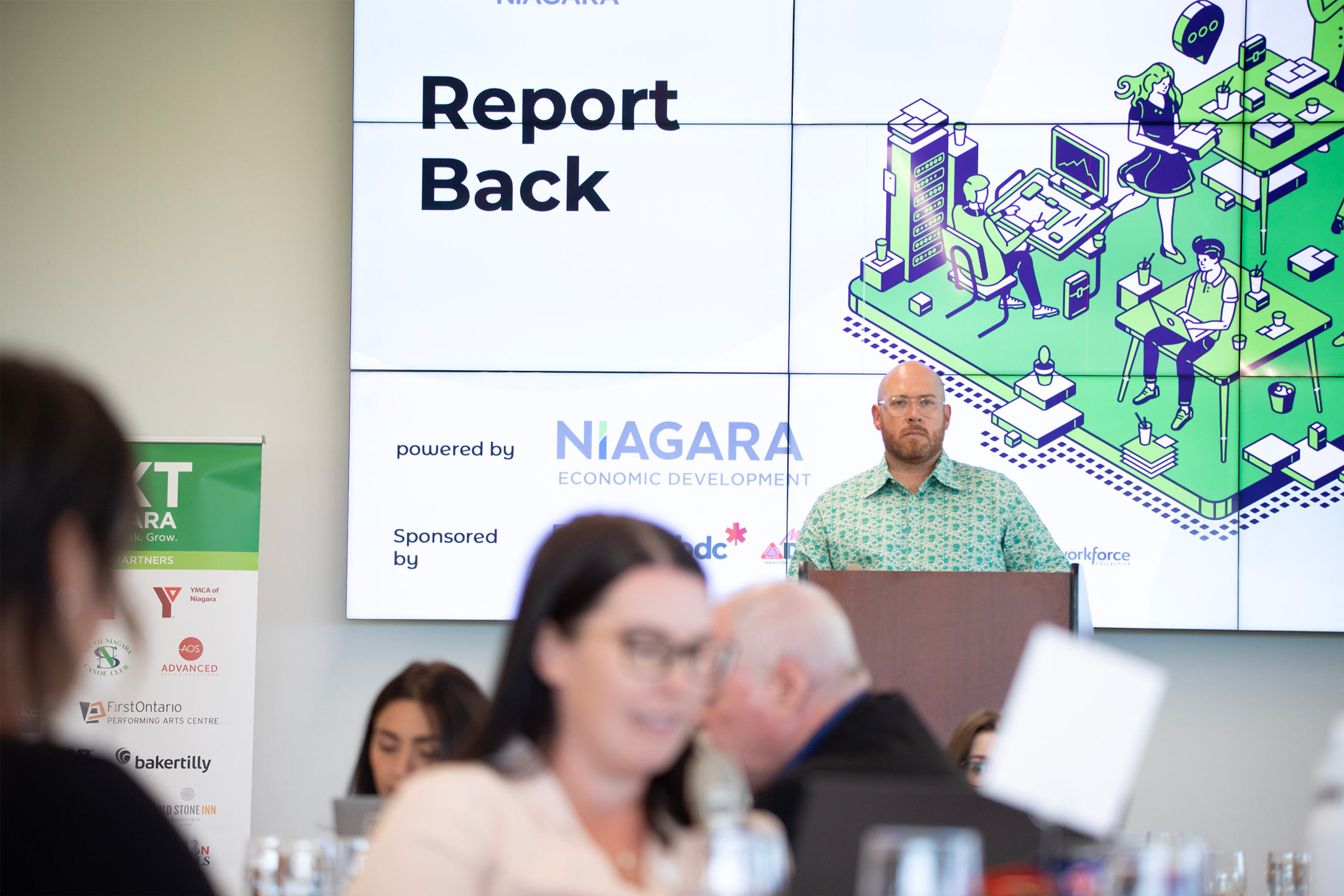
Innovating Solutions for Today’s Challenges in Employment
On September 18, 2023, the NEXTNiagara Council, in collaboration with the Greater Niagara Chamber of Commerce, hosted Engage 2023. The aim of this event was to create space for young professionals and employers to have open conversation about the evolving needs of the workforce in Niagara.
The event had two interactive roundtables focused on 1) key workforce challenges and 2) brainstorming potential solutions. The goal was to collaboratively develop ideas that may support employers’ hiring needs and the meaningful employment of young professionals in Niagara.

Roundtable 1:
What are the Workforce Challenges?
We hear that while finding meaningful work is a concern for young professionals, attracting and retaining qualified workers has also become a challenge for employers. In the first roundtable young professionals and employers discussed:
- challenges related to the hiring and retention of workers
- the reasons that deter young professionals from applying to jobs
- factors influencing individuals to leave their job
 Challenges to the hiring and retention of workers
Challenges to the hiring and retention of workers
There was a broad scope of challenges to hiring and retention from both employer and young professional perspectives. Some shared challenges that employers highlighted were an increase in individuals not showing up or not being appropriately prepared for interviews.
Employers also noted that skill gaps are a barrier to hiring. Digital skill gaps are an area employers see as key areas to upskill, especially for the older generation. Interpersonal skill gaps were also identified as one of the most important concerns when hiring. This gap is clear in the interview process when communicating skills and abilities and is critical to changing work environments. As companies shift to hybrid work models, skills like communication, time management, and teamwork are increasingly important.
Young professionals noted family care/responsibilities as a factor that would be supported by hybrid/flex work opportunities. If these options are not available, finding work can be a challenge. Transitioning to remote work also poses hiring challenges for some employers, however, as virtual onboarding can be difficult depending on the industry.
Last, we heard that young professionals feel that employer expectations are very high, and sometimes differ from employees’ expectations. To address this, one common theme was to increase communication between employers and employees on expectations (when hiring and on an ongoing basis).
 Challenges to applying to jobs
Challenges to applying to jobs
One of the main barriers to applying for jobs is the lack of clarity in job postings. Young professionals said that a clear job description is particularly important. Further, not showing certain information such as salary and work arrangements (e.g., in person, hybrid, remote) is a major deterrent for potential applicants. Not including this information can set unmet expectations for job candidates, leading to challenging or failed negotiations.
Another barrier to applying for jobs is experience requirements. Both employers and employees mentioned that there is often a disconnect about experience requirements. Often job seekers find that the required experience exceeds the job description and does not match the offered compensation. Young professionals also noted that applying for entry-level jobs that require specific designations/certifications can be a financial challenge.
Participants also indicated that they are not always sure where to find relevant jobs. This can be worsened for individuals that don’t have personal connections in their industry of interest. Last, the lack of transportation in the region is a barrier to applying for jobs, especially when commuting between municipalities.
 Reasons why people leave their jobs
Reasons why people leave their jobs
One significant reason people leave jobs is unfair compensation and limited growth opportunities. Young professionals expressed that low salary is probably the main reason for quitting a job. In addition, employees expect their employers to highlight career growth potential and support professional development/training. If these opportunities are not available people may leave.
Another of the most common reasons that young professionals leave their jobs is lack of flexibility. Not offering hybrid work options, competitive vacation and sick days, and other flexible benefits that support work-life balance is a deterrent. Further, if expectations change (e.g., hired for a remote or hybrid role but is changed to an in-person role), people may be more likely to leave.
Roundtable participants noted that through the pandemic, mindsets have shifted, particularly for young professionals. Jobs that offer good life balance are one of the most important retention factors. Lack of flexibility likely leads to reduced productivity and employee disengagement.
Another reason contributing to young professionals leaving a job is a negative work culture. This can include a lack of recognition and support from supervisors, lack of support for employee wellbeing, and poor communication.
Young professionals expressed that when it comes to work culture, they want to work for an organization that is transparent, provides autonomy, shares their values, and supports their mental health and wellbeing. Young professionals are seeking meaningful work where they have an impact. This could be a challenge at businesses where employees feel that “they are just a number”, and don’t have any valuable, individual contribution. In terms of communication, lack of transparent and honest dialogue from management often results in a lack of clarity about goals, low morale, and poor work culture. Together, this may affect individuals’ decision to quit.

Roundtable 2:
How to Attract and Retain Young Professionals?
In the second roundtable, young professionals and employers discussed their perspectives on how to attract young professionals and incentivize them to stay in their jobs. Groups narrowed their discussion to three main challenges and discussed :
- what incentivizes young professionals in the area
- what actions need to be taken to address the challenge
- what resource would be needed to address the challenge
We saw several themes emerge from the group discussion which are outlined below.
 Transparency and Clarity in the Recruitment Process
Transparency and Clarity in the Recruitment Process
Clear job posts are essential to increase the attraction and retention of employees. Young professionals are incentivized to apply to jobs when employers clearly outline job expectations, pay scales, total compensation packages, type of work (e.g., remote, hybrid, in-person), and flex work options. They also expect employers to be transparent about the company values in the hiring process.
From an employer perspective, interviews should involve various team stakeholders in the hiring process. They also indicated that interviews should assess interpersonal skills or emotional intelligence rather than focusing on hard skills and credentials.
Fair compensation is essential to building trust and retaining talent. Participants indicated that young professionals are increasingly not willing to work for companies that do not pay a living wage and/or cannot provide salary increases. Further, benefits beyond compensation (e.g., work from home, health benefits, number of sick days, vacation) are key factors young professionals consider when changing jobs.
 Opportunities for Employee Growth and Development
Opportunities for Employee Growth and Development
Opportunities for employees to train and grow in their career is another key factor in attraction and retention. Career development can be supported through structural implementation like job sharing, cross training, and job shadowing. However, young professionals are also attracted to companies that offer career development like mentorship, training investments, and support further education. Having clear goals and professional development plans support both employees and employers in achieving this.
Employers expressed that mentorship helps to humanize the workplace helping to retain workers longer. Young professionals highly appreciate employers that invest in learning by reimbursing them for taking courses and certifications, as it creates a more long-term employee-standing relationship.
 Workplace Culture
Workplace Culture
Creating a culture that trusts employees to make decisions, values feedback, and encourages employee voices is key to attracting and retaining talent. Young professionals are attracted to a workplace that empowers them to do their jobs in a way that works best for them while still aligning with organizational expectations. This also allows employers the opportunity to support individual goals. In addition, discussions indicated that workplace culture that supports mental health by fostering empathy, trust, and open communication is one of the most important factors to retain talent.
Young professionals also appreciate a culture of feedback which fosters constructive criticism but also appreciates employees’ contributions. It was expressed that organizations that recognize staff contributions give a sense of fulfillment and achievement which may lead to retention. This also links directly to young professionals’ value of open communication. Employers that have regular checkpoints and schedule one-on-one meetings give the opportunity to provide feedback in both directions. Employers said that open communication is also key in discussing lifelong learning plans. Having regularly scheduled meetings allows for discussion on career goals and what resources are needed to achieve those goals.
Actions in the workplace that can support good workplace culture include conducting staff feedback/engagement surveys, promoting positive culture within teams, and ensuring workplaces are inclusive and respectful. Resources that also support workplace culture are team building events, having inclusive or safe spaces, and training or orientation for staff and managers to learn about culture, strategies, and support for staff.
 Exploring Models for Different Ways to Work
Exploring Models for Different Ways to Work
Workplace flexibility is also key to increasing hiring and retention. Young professionals increasingly are looking for jobs that allow hybrid or remote work and that have compressed hours. They also consider jobs that offer more flexibility and understanding of employees’ circumstances such as sickness, childcare, personal days, and transportation challenges. Young professionals indicated that offering flexible work shows that an employer prioritizes peoples’ lives and allows people to get their jobs done in a way that works best for them.
In the roundtables, we heard individuals say that flexibility in hours and workplace attendance can substitute higher wages (to an extent) if an employer cannot offer competitive compensation. Employees who become accustomed to a more flexible work environment may tend to favour similar vacancies when seeking a new job. Offering flexibility where possible can build loyalty and a positive workforce culture with happier employees.
There was discussion on how flexible work can best be implemented. Suggestions for resources included policies that allow for flexibility in work, and workplace resources that allow staff to access what they need. Roundtable conversations recognized that blanket policies or statements likely will not work, and individual accommodations or different types of strategies would work best.
 Transportation
Transportation
Finally, both employers and young professionals expressed that tackling transportation challenges in the region is also critical to attracting talent. Participants suggested that employers could offer rideshare options or create a carpool programs/group transportation with other local businesses in the area.

THE WRAP:
Conclusions & Recommendations
Young professionals in Niagara are increasingly seeking for jobs that allow a good life balance through flexible work arrangements and fair compensation, have a culture that encourages autonomy and employee voices, and have clear opportunities for career advancement.
To promote meaningful employment and address the evolving challenges of hiring and retention in the region, employers should ensure that their workplace is transparent throughout the recruitment process, fosters a culture that supports employees through their career journeys, and promotes open and honest communication.
In collaboration with

Report by


NEXTNiagara News
Engage: Innovating Solutions for Today’s Challenges in Employment
On September 18, 2023, the NEXTNiagara Council, in collaboration with the Greater Niagara Chamber of Commerce, hosted Engage 2023. The… more »
Call for EDI Advisory Committee Members
The Greater Niagara Chamber of Commerce (GNCC) is dedicated to creating an inclusive and equitable environment where every voice is… more »
REALTalk: Money Matters
Presented by NEXTNiagara Are you tired of living paycheque to paycheque and feeling like you’re never making progress with your… more »




